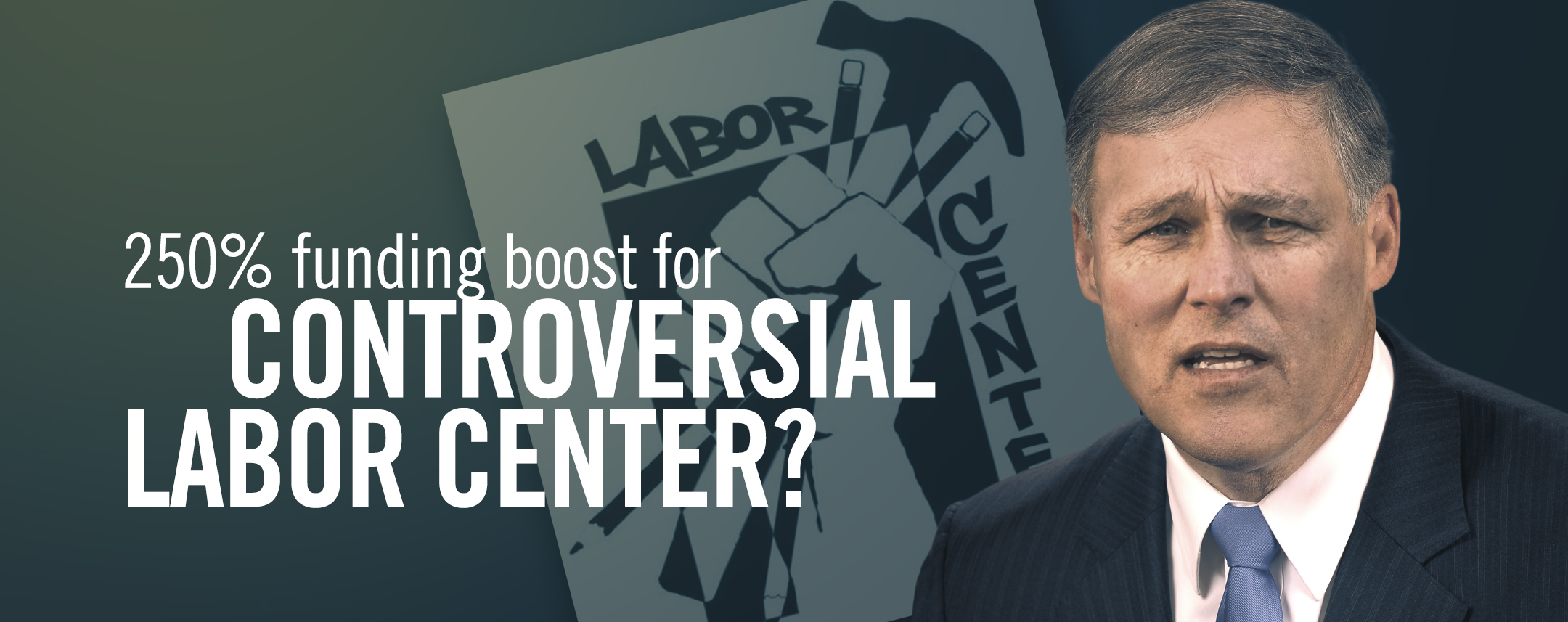Gov. Jay Inslee’s proposed budget for the 2017-19 biennium seeks to allocate an additional $778,000 for the Labor Education and Research Center (LERC) at South Seattle College, an increase of nearly 250 percent over its current state funding of about $160,000 per year.
As the Freedom Foundation has extensively documented, LERC functions as little more than a taxpayer-subsidized labor activist group, though it prefers to describe itself in the language of higher education. Public records requests have indicated that LERC performs research work for groups like the Washington State Labor Council and participates in protests with labor activist groups like Working Washington.
Formerly based at The Evergreen State College, LERC moved to South Seattle in 2010 after an internal TESC audit found LERC to be engaged in ethically questionable activity and the legislature cut back its funding.
Since at least 2013, LERC staff have been working to get the Legislature to boost its funding. Budget proposals from Gov. Inslee and Democrats in the state Legislature now consistently propose dramatic increases in LERC’s budget though, so far, the Freedom Foundation’s documentation of LERC’s activity has helped prevent any such increases from making it into the final budget.
Based on the material uncovered by its public records request, the Freedom Foundation filed two formal complaints against LERC in early 2015, one with the state Public Disclosure Commission (PDC) alleging LERC staff failed to report their lobbying efforts to get the state legislature to increase its funding, and one with the Executive Ethics Board (“the board”) alleging LERC inappropriately used state funds for political activity in support of the 2013 minimum wage initiative in SeaTac.
In December 2015, the PDC concluded LERC had, indeed, engaged in unregistered lobbying and broken the state’s campaign disclosure laws.
In September 2016, however, the board dismissed the Freedom Foundation complaint. The dismissal prompted Sarah Laslett, the former LERC-director, to pen an article posted on the Washington State Labor Council’s website deriding the Foundation’s complaint.
Laslet’s article makes a number of dubious claims, among them:
“Being a program of an institution of public education, South Seattle College, LERC responded (to the Freedom Foundation records requests and complaints) with all the transparency we could, knowing that, although we had done nothing wrong, we were in for a long road… Two years later, we are exonerated.”
But, as Laslett is forced to admit, “The Public Disclosure Commission complaint was resolved in December 2015 with a finding that the Seattle College District had, in fact, failed to file lobbying forms in a timely way.” Still, she describes the violation as “an unfortunate oversight” and attempts to shrug it off on the grounds that “nothing of huge significance happened because of that lobbying activity. No additional funding for the Labor Center was forthcoming because of the unreported activity.” In all likelihood, the reason that no additional funds were forthcoming was that the Freedom Foundation blew the whistle on the nature of LERC’s program and activity.
Laslett spends most of her article on the ethics complaint, which the board ultimately dismissed. The complaint alleged that LERC bused dozens of participants in its Summer Institute for Union Women (SIUW) to SeaTac to participate in a rally in support of Proposition 1—the $15 minimum wage initiative that went on to pass narrowly in Nov. 2013—and, in so doing, had violated RCW 42.52.180, which provides:
“No state officer or state employee may use or authorize the use of facilities of an agency, directly or indirectly, for the purpose of assisting a campaign for election of a person to an office or for the promotion of or opposition to a ballot proposition.”
Laslett’s defense of LERC’s activity consists of two prongs. First, she contends,
“…when SIUW participants went to Sea-Tac Airport in June 2013, the ballot initiative had not yet been certified, let alone any campaign in support of it having been publicly initiated… The timing of the action and the initiative certification was obvious to anyone who bothered to look. Clearly, the Freedom Foundation was willing to ignore the timeline.”
Despite the bluster, Laslett is flat out wrong on this point. The Freedom Foundation complaint alleged that Proposition 1 was formally a “ballot proposition” no later than June 20, 2013. The protest took place exactly one week later, on June 27. The board’s investigator confirmed that “SeaTac proposition 1 would be considered a ballot proposition as of June 5, 2013…”
Clearly, timing wasn’t the issue.
Unfortunately, the board bought into LERC’s other claim “that the Labor Center was carrying on a long educational tradition within the SIUW by participating in the action.”
RCW 42.52.180(2)(d) contains an exemption that permits state employees to use public resources for political activities if the activities “are part of the normal and regular conduct of the office or agency.”
The board used this exemption to let LERC off the hook;
“WSLERC’s mission and the goal of their program and curriculum are to expand labor education in Washington State. To this end, WSLERC partners regularly with labor groups and the demonstration appears to have been a useful real-world educational tool for participants in the conference. Organizing opportunities for WSLERC students to participate in such demonstrations would fall under the exception in the statute for ‘activities that are part of the normal and regular conduct of the agency.'”
In other words, the board took the extraordinary position that the statute preventing state employees from using public resources for political activities doesn’t prevent LERC from using tax resources for union politics precisely because this is part of LERC’s “normal and regular conduct.” In effect, the board recognized what the Freedom Foundation has argued from the beginning—that LERC is simply a tax-funded union activist group.
The outcome should not come as much of a surprise, given who sits on the board. One of the five board members is Sumeer Singla. A trial lawyer, Singla was appointed to the board by Gov. Inslee in 2014. His LinkedIn profile indicates Singla worked as the policy director for the Washington State Senate Democratic Caucus from 2010-2011. Public Disclosure Commission records indicates Single make regular campaign contributions to Democrats and progressive political candidates in Washington. The fact that he is aligned with labor-backed politicians is not as disturbing, however, as the fact that Singla was actively representing a major labor union, SEIU 775, in litigation involving the Freedom Foundation at the same time he signed off on the dismissal of the Foundation’s complaint against LERC. As the Freedom Foundation has extensively documented, Working Washington, the group the board investigation determined was the primary instigator of the protest LERC participated in, is just a front group for SEIU 775.
One of the other Executive Ethics Board members is John Ladenburg, a prominent Pierce County Democrat. John’s brother, Barry Ladenburg, was elected to the SeaTac city council in 2011 with a tidal wave of union money. As it happened, Barry turned out to be a strong supporter of the union-backed Proposition 1 two years later.
With these individuals on the board, it’s not surprising LERC was let off the hook.
The past two years have proven LERC views itself as the taxpayer-funded servant of Washington’s labor unions and that it is willing to bend and occasionally break state laws in pursuit of its agenda. At the same time, state entities tasked with preventing this kind of behavior either give LERC a pass or, at best, a slap on the wrist.
Ultimately, the solution lies with the state Legislature, which should end taxpayer-funding for LERC once and for all. Labor unions benefit from enough special privileges and exemptions in state law as it is. There’s no reason Washington taxpayers should have to fund labor’s political activism directly.












